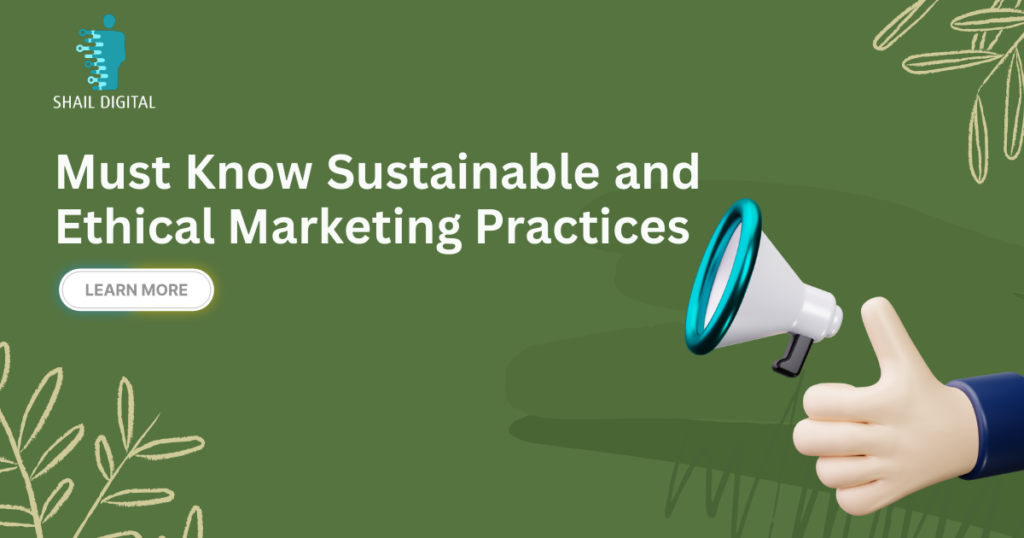5 Must Know Sustainable Business Strategies

In today’s world, consumers are more aware than ever of the impact their choices have on the planet. As a result, sustainable business strategies are no longer just nice-to-haves; they’re essential.
Adopting these ethical digital marketing ideas not only helps the environment but also builds trust and loyalty with your audience and build a better image of the brand for years to come.
Let’s dive into how your brand can embrace sustainability with these ethical digital marketing ideas.
Adopt Sustainable Business Stragies
Sustainability starts with the choices your brand makes every day. This includes everything from sourcing materials responsibly to reducing waste and lowering your carbon footprint. One of the powerful ethical marketing example is Patagonia, which is renowned for its commitment to using recycled materials and supporting environmental causes. By taking similar steps, you can make a significant impact.
Real-Life Inspiration:
- Patagonia’s “Worn Wear” program encourages customers to repair, reuse, and recycle their clothing, promoting a circular economy.
- Bhu uses organic cotton and natural dyes, ensuring their production process is eco-friendly and sustainable.
Imagine your customers wearing garments that they know are helping the planet. Or they’ve owned something for years, knowing they’re part of something bigger.
Be Transparent
Today’s consumers want transparency on what they are buying, using or consuming. They want to know where products come from, how they’re made, and what impact they have on the environment. As part of your sustainable business strategy show them the complete journey without any filter or edit. By giving an inner-view to the working of your organization, you will make your audience feel like they’re part of your brand, thus increasing trust.
Real-Life Inspiration:
- Everlane’s “Radical Transparency” campaign openly shares their factory information, pricing structure, and production processes.
- Fabindia, a popular Indian retail brand, openly shares information about their artisans and production processes.
Think of how much trust you’ll build by being honest about your efforts and challenges like these brands and be remembered for something good.
Highlight Ethical Practices
Having sustainable business strategies involves honesty, fairness, and responsibility. This means no false claims or greenwashing. Highlight the ethical aspects of your business, whether it’s fair labour practices, cruelty-free products, or giving back to the community. Consumers respect and support brands that genuinely care.
Real-Life Inspiration:
- TOMS Shoes implements a “One for One” model, donating a pair of shoes for every pair sold, and expanding into other charitable programs.
- The Body Shop India focuses on cruelty-free products and ethical sourcing.
Picture your brand being synonymous with giving back, making a tangible difference, fairness and ethical responsibility.
Educate Your Audience
Education as a sustainability marketing tool should not be underestimated. Therefore use your platform to inform and educate your audience about the importance of sustainability and ethical practices. Share tips on how they can make more eco-friendly choices and the benefits of supporting green marketing and sustainable brands.
Real-Life Inspiration:
- IKEA’s “Live Lagom” project provides tips and products to help customers live a more sustainable and balanced life.
- Tata Tea’s “Jaago Re” campaign raises awareness about social issues, including sustainability.
Imagine your customers feeling empowered and informed, making better choices thanks to your guidance.
Spotlight Success Stories
Showcase ethical marketing examples of brands and businesses in the form of case studies, interviews, and success stories. This not only inspires your audience but also demonstrates your commitment to promoting positive change.
Real-Life Inspiration:
- Highlight brands like Seventh Generation, which focuses on eco-friendly household products and uses plant-based ingredients.
- Highlight brands like Forest Essentials, which focuses on using natural ingredients and traditional Ayurvedic practices.
Think about how inspiring it is to see others succeed and know you can too.
Adopting sustainable business strategy is not just about following a trend; it’s about making a real difference.
By being transparent, educating your audience, and highlighting your ethical practices, you can build a loyal customer base that values and supports your efforts.
Let’s work together to create a better, more sustainable future.


Recent Comments